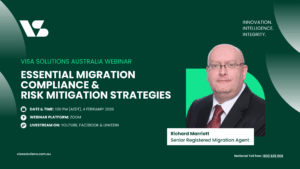Do you want to study in Australia to gain a qualification and return to your home country, or is your ultimate goal to stay in Australia and pursue permanent residency? Each pathway has a different outcome and knowing which direction you’re headed towards will help you make the right choices when it comes to your area of study and whether it will offer you a pathway to permanent residence.
Whichever outcome you are seeking, there are several things you need to do before you come to Australia.
Choose an Area of Study at a Recognised Institution
To be able to study in Australia, you need to be enrolled in a full-time course that is registered on the Commonwealth Register of Institutions and Courses for Overseas Students (CRICOS).
International students can apply directly to the education institution or through an authorised education agent.
If successful, you will receive a letter of offer. Once accepted, you will receive a Confirmation of Enrolment (CoE).
If you intend to pursue permanent residence after studying, it’s important that you think about the course’s prospects and the chances of it assisting in gaining permanent residence. It may be a good idea to look at current occupation lists to see if the occupation you are studying for is on either of the lists, however occupation lists can change so there is a possibility that your chosen career may not be on the occupation list once you complete your qualification.
English Language Testing
There are usually English language requirements to study in Australia. To prove your English language level, you will need to provide one of the following:
- Proof that you are a citizen of and hold a valid passport issued by the United Kingdom, United States of America, Canada, New Zealand or the Republic of Ireland
- A certificate of results from one of the approved English language tests
Australia’s Department of Home Affairs accepts scores from the following English language tests:
- International English Language Testing System (IELTS), including One Skill Retake (OSR)
- Pearson Test of English (PTE)
- Cambridge English (CAE)(also known as C1 Advanced)
- Occupational English Test (OET), a test developed for health professionals
- Test of English as a Foreign Language (TOEFL iBT)
Apply for a Student Visa
To be able to study in Australia, you will need a Student Visa (subclass 500). To apply for a student visa, you must:
- Provide Confirmation of Enrolment (CoE) into your course
- Provide proof of English proficiency
- Meet genuine student requirements
- Meet the financial capacity requirements (you need to show evidence that you have savings to cover the costs and expenses associated with your course including travel, course fees and rent)
- Ensure you have Overseas Student Health Cover (OSHC)
- Meet health and character requirements
- Sign the Australian values statement
You will need to pay a fee to lodge your student visa application.
About Student Visas (subclass 500)
The student visa (subclass 500) enables those of school age to enter Australia to undertake a course of study. Student visas are valid for up to five years. The length of stay granted is determined by the course the applicant intends to study. Holders of a student visa can work up to 48 hours a fortnight (in most circumstances). Learn more about student visas.
Once Your Visa Has Been Approved
Once your visa has been approved, you will need to arrange for your arrival in Australia. You will need to organise flights and accommodation. You will have to provide an Australian address on your incoming passenger card when you arrive in Australia so it’s important you have accommodation organised prior to your departure. Ensure you allow enough time after arriving in Australia to get settled into your new city before your course starts.
You will need to have the following when you arrive in Australia:
- Passport
- Visa, including your letter of offer and Confirmation of Enrolment
- Overseas Student Health Cover Policy
- Receipts for payment (e.g. tuition fees, OSHC etc)
- Original or certified copies of transcripts and qualifications
- Other identification documents such as birth certificate, drivers licence etc
- Medical records and prescriptions
- Money
Other Things to Consider
If you are bringing a mobile phone or other electronic devices, ensure the voltage and power adapter comply with Australian standards.
Your student visa allows you to work up to 48 hours a fortnight. It’s advisable to apply for a Tax File Number through the Australian Tax Office (ATO) so your income is not taxed at a higher rate.
What do you want to study? Will you stay in Australia or return home? Whichever pathway you choose, studying in Australia can be a rewarding and fulfilling experience and being well prepared when you arrive in Australia will help make the transition seamless.




